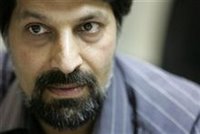
RadioFreeEurope/RadioLiberty - Prague,Czech Republic
Monday, August 21, 2006
Is the concept of an Islamic state compatible with accepted notions of human rights? Can the modern concept of human rights make headway in the face of religious dogma and Islamic traditions? Emad Baghi, the head of the Tehran-based Organization for the Defense of Prisoners' Rights, in this interview explains the difficulties of securing respect for human rights in Muslim countries as a result of the eclipse of a deeply rooted humanist tradition in Islam.
In answers given to Fatemah Aman of Radio Farda, Emad Baghi sketches out the battle lines in debates about human rights -- within Islam, within Iran, between the secular and religious of all religions, and between tradition and modernity -- and argues that there are traditions both of Islamic law and Islamic mysticism in which modern concepts of human rights can be bedded. Tradition and modernity can coexist in Islamic society, he maintains, and those who want to promote human rights need to explore those religious traditions.
(...)
I believe that we must first realize that the foundations of the modern concept of human rights were laid less than two centuries ago. Those have then been developed in more recent times. Central to the concept of human rights is individualistic humanism and human dignity. The judicial basis of the modern world is centered on this dogma. If we accept this as fact and look at our own cultural heritage, we see that such elements have indeed existed in our culture. In gnosis [the Irfan tradition of mysticism, particularly prevalent in Iran and Shi'ite Islam] and Sufism, there is little or no attention paid to religious expressions. It is often hard to determine whether a mystic is a Shi'a or a Sunni. An appreciation of human dignity is prominent in gnostic texts. There is an overwhelming body of evidence in this regard. Here, I would like to refer just to the poetry of [Sa'ad Uddin Mahmud] Shabestari [an Iranian mystic writer and poet (c.1250 – 1320)]. There are several references in his poems that emphasize the centrality of humans in his world view. Such examples can also be found in the Koran.
So we do have this philosophical, humanistic view both in our gnosis and in Islam. However, this view has been reduced and transformed into a view that is inflexible, limited, and based on jurisprudence. In fact, the entire religion has been reduced to jurisprudence and decrees issued in religious dissertations. It is this reductionism that has prevented the humanistic views expressed in our ancient literature from flourishing. If these views had not been victimized by religious reductionism, we would have had a much less totalitarian structure of power through the centuries.




1 comment:
An excellent article :) Such humanistic views are also found in the Qur'an and hadiths. Here are two links:
Wisdom and Adab of the Qur'an:
http://darvish.wordpress.com/2006/06/26/wisdom-and-adab-of-the-quran/
Islamic Principles of Peace:
http://darvish.wordpress.com/2006/07/15/islamic-principles-of-peace/
Ya Haqq!
PS I have you on my blogroll :)
Post a Comment